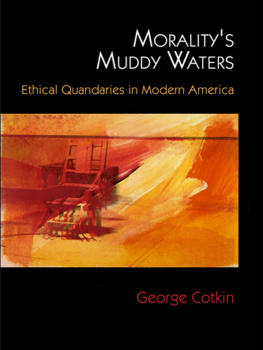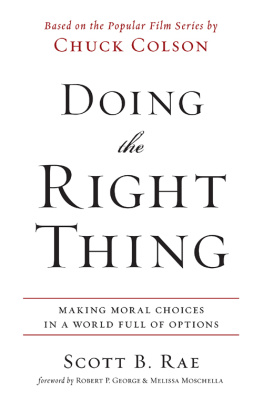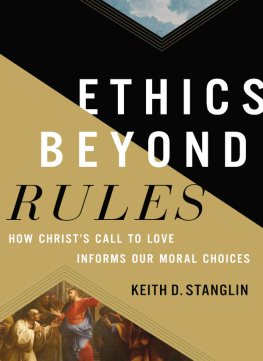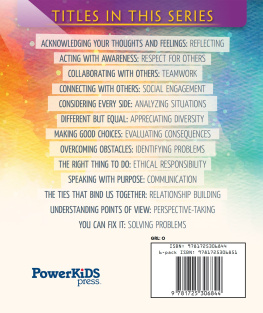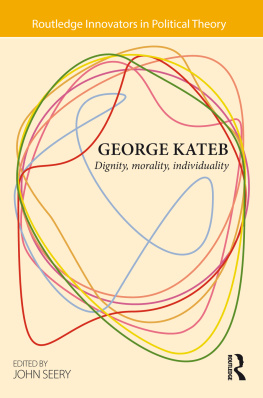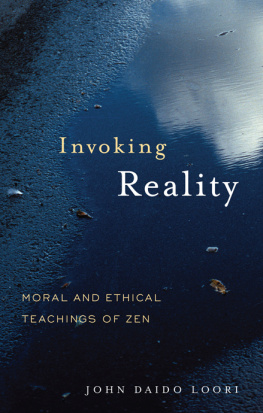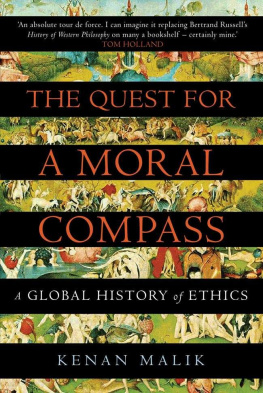Moralitys Muddy Waters
Moralitys
Muddy Waters
Ethical Quandaries in Modern America
George Cotkin
University of Pennsylvania Press
Philadelphia
Copyright 2010 George Cotkin
All rights reserved. Except for brief quotations used for purposes of review or scholarly citation, none of this book may be reproduced in any form by any means without written permission from the publisher.
Published by
University of Pennsylvania Press
Philadelphia, Pennsylvania 19104-4112
Printed in the United States of America on acid-free paper
10 9 8 7 6 5 4 3 2 1
Library of Congress Cataloging-in-Publication Data
Cotkin, George
Moralitys muddy waters : ethical quandaries in modern America / George Cotkin.
p. cm.
Includes bibliographical references and index.
ISBN: 978-0-8122-4227-0 (alk. paper)
1. EthicsUnited StatesHistory20th centuryCase studies. 2. EthicsUnited
StatesHistory21st centuryCase studies. 3. Ethical problemsCase studies.
4. Bombing, AerialMoral and ethical aspects. 5. World War, 19391945Moral
and ethical aspectsUnited States. 6. My Lai Massacre, Vietnam, 1968Moral
and ethical aspects. 7. RacismMoral and ethical aspectsUnited States. 8. Capital
punishmentMoral and ethical aspectsUnited States. 9. Iraq War, 2003 Moral
and ethical aspects. 10. United StatesHistory1945. I. Title.
E839.C68 2010
2009041294
973.91dc22
For My Father
Contents
Preface
The idea for this book came to me a few years ago, the evening I saw Hotel Rwanda. At the time I was writing a book about American cultural criticism since World War II, an engrossing and satisfying project. But the films depiction of suffering, the moral heroism of Paul Rusesabagina, and the politics of intervention all followed me out into the suddenly uncomfortable night air. I told my wife, Marta, that I needed to write a more relevant book that would grapple with inhumanitya work that might generate moral clarity and engagement. Marta sagely counseled me to wait a couple of weeks before abandoning my work on cultural criticism. Early the next morning, however, I was at my desk, hunched over the new project.
The book before you took several turns before it gradually attained its present form. At first, I imagined that it would be about scholars and activistsErich Fromm, Iris Chang, Ben Kiernan, Hannah Arendt, and Robert Jay Liftonwho had devoted themselves to trying to understand and challenge the evil in the world. How could they immerse themselves in the muck of hatred without paying a price? Hadnt Nietzsche famously warned against looking into the abyss of evil, lest it engulf you? What could be learned from these figures of moral authority and their excavations of the landscape of cruelty? While such a book still needs to be written, I ended up on the more familiar ground of postwar American history, starting to wonder if moral questions are indeed answerable with any degree of certitude.
As this work emerged, I came to realize that while we must take moral stands against real evils, such standsand especially the means we choose to defend themcan be challenged fairly by others. We do well to acknowledge potential truths in other stances, for only out of debate and process can strong moral thinking emerge. Thus, although I remain personally opposed to capital punishment, I have come to respect the position of those in favor of it. While we may never agree on the death penalty, perhaps the volume of our shouting back and forth can be lowered.
Introduction
Americans crave moral clarity. Some ponder how Jesus would act in a particular situation. Others seek guidance elsewhere on how to cultivate a moral character. Even when moral clarity is presumably close at hand, we stumble. Moral stricturesthou shalt not commit adultery, honor thy mother and father, and cherish human lifebecome matters of testimonial adherence rather than living reality.
Of course, such strictures are invaluable as general landmarks along lifes crooked trails. They are inadequate and sometimes dangerous, however, for the tough situations we often confront. Decisions are called for in moral moments when we have to choose between two less than appealing options. Act we must but the manner may be perplexingly paradoxical. Such is the nature of moral moments.
Alas, we often find that even when we begin with the best of moral intentions, things go awry. Rather than questioning the paradoxes of morality or the reign of contingency (moral luck) in situations, we stubbornly ignore complexity and contradictions, determining to soldier on or to condemn a world that does not bend to our moral principles. Beyond parading our moral presumptions, we come to believe that we act more morally the less we think about it. Hence former President George W. Bush proudly proclaimed that he acted from his gut or from his religious feelings. And in the bestselling volume Blink, journalist Malcolm Gladwell celebrates how first impressions or inclinations are on target more often than deeper ruminations about a particular problem. Listening to your instinct and acting without careful deliberation appear to be the common responses to present-day moral challenges.
Moralitys Muddy Waters: Ethical Quandaries in Modern America rejects such easy certitude and argues that what we need instead is a healthy dose of befuddlement, and even when we are assured that our ends are correct and moral, as in ending a war or supporting democracy, the means to achieve them may be deeply problematic. Acceptance of the difficulty of acting morally starts us on a road toward greater moral enlightenment. It opens up the process that philosopher Hannah Arendt referred to as simply thinking, which halts us in our tracks, makes us aware of our choices and responsibility, and strikes the chords of tragedy and irony that we need to hear more often.
Like morality itself, the very concepts we employ in discussing and acting on itempathy, evil, and characterare essential as well as troubling. Without empathy, we fail to inhabit or even appreciate the world of others. With empathy, we sometimes perceive others experience in a vicarious manner; we prioritize alleviating their suffering over political complexities. Evil gets bandied about as a meaningless epithet or rejected as a metaphysical conceit. Yet evil must remain in our moral vocabulary, for it captures much of the horror that happens, both within the world and in our hearts. Moral character, based upon virtue, is, of course, necessary; without it we are blown by the winds of social convention or peer pressure. But how well does moral virtue hold up when confronted with moral luck, with contingencies that push and pull, that sap our moral stamina? Historical analysis of situations in modern America may help us to reenergize these concepts for moral thinking and acting.
This book is about how Americans have confronted moral issues, sometimes with swagger, sometimes with nonchalance. How have people thought about their actions in moral terms before the dust of history has settled? Were their horizons of moral contemplation cloudy or clearand why? And how do we, after the fact, consider and debate these actions and events?
Ethics and morality have long graced the disciplines of literature and philosophy. Richard Rorty and Martha Nussbaum, for example, proclaimed that fiction cultivates our ethical or moral sensibilities. This builds upon critic Lionel Trillings view that literature supports the moral imagination by presenting it with situations teeming with variousness, possibility, complexity, and difficulty.

